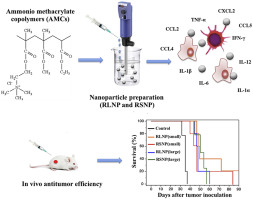Biomaterials ( IF 12.8 ) Pub Date : 2018-03-02 , DOI: 10.1016/j.biomaterials.2018.02.053 Maryam Alsadat Shetab Boushehri , Valentin Stein , Alf Lamprecht

|
Nanoparticles create exciting platforms for anticancer immunotherapy and vaccination, though their inherent immunomodulatory properties have remained underexploited. Ammonio methacrylate copolymers (AMC) are well-established excipients in pharmaceutical industry and components of controlled-release oral formulations. Here, we demonstrate that nanoscaling of type A and B AMC (Eudragit® RL and RS) endows these inactive ingredients immunostimulatory properties exploitable for cancer therapy. The particles induce the secretion of various pro-inflammatory cytokines and chemokines from the cells of innate immunity. Though the underlying mechanisms are not fully uncovered, the current work established the partial involvement of Toll-like Receptor 4 (TLR4) and Nuclear factor κB (NF-κB). The size and charge-dependency of the particles' pro-inflammatory properties and cytokine/chemokine induction profile was also demonstrated. Within the context of cancer immunotherapy, biweekly peritumoral nanoparticle injection led to a complete regression of the syngeneic colorectal tumor, or a significant growth retardation thereof, considerably extending the survival of tumor-bearing animals. Additionally, presence of the immunological memory in treated animals was established. Given their better economical and relatively safer profile compared to well-established chemo- and immunotheraputics, and their ability to serve as carriers for drug targeting, vaccination and combination therapy, AMC nanoparticles (AMCNP) are fascinating subjects for further research in the field of cancer therapy.
中文翻译:

甲基丙烯酸铵共聚物的无货物颗粒:从药物惰性成分到有效的抗癌免疫疗法
纳米粒子为抗癌免疫疗法和疫苗接种创造了令人兴奋的平台,尽管它们固有的免疫调节特性仍未得到充分利用。甲基丙烯酸氨酯共聚物(AMC)是制药行业公认的赋形剂,是控释口服制剂的组分。在这里,我们表现出A类和B AMC(丙烯酸树脂的那个nanoscaling ®RL和RS)赋予了这些非活性成分免疫刺激特性,可用于癌症治疗。所述颗粒诱导先天免疫细胞分泌各种促炎细胞因子和趋化因子。尽管尚未完全揭示其潜在机制,但目前的工作确定了Toll样受体4(TLR4)和核因子κB(NF-κB)的部分参与。还证明了颗粒的促炎性质和细胞因子/趋化因子诱导概况的大小和电荷依赖性。在癌症免疫疗法的背景下,每两周一次的肿瘤周围纳米颗粒注射导致同基因结直肠肿瘤的完全消退或其显着的生长迟缓,从而大大延长了荷瘤动物的生存期。此外,建立了在治疗动物中免疫记忆的存在。与成熟的化学疗法和免疫疗法相比,它们具有更好的经济性和相对安全性,并且具有作为药物靶向,疫苗接种和联合疗法的载体的能力,AMC纳米颗粒(AMCNP)吸引了癌症领域的进一步研究治疗。











































 京公网安备 11010802027423号
京公网安备 11010802027423号